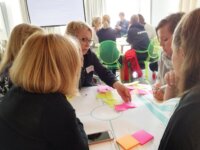New Zealand has developed the Emergency Caller Location Information (ECLI) Service. The Service enables Public Safety Organisations (PSOs) to receive automatically generated geographical information about the location of a caller when an emergency call is connected to a mobile cellular network, from any mobile device. ECLI saves lives by decreasing the time taken to verify location and reduce the average dispatch time to incidents, with controls in place to protect callers’ personal…
Innovation Tag: Design
In the Northern Ireland Civil Service, over 70% of absence days are due to staff on long-term sick (absences lasting 20 working days or more). Using behavioural insights, the Lab designed a new suite of letters to support employees when they go off sick. The letters reject traditional formal approaches of absence management in favour of empathy, clarity, and empowerment. Both line managers and staff feel the letters are a huge help in providing the support they need when off sick.
We created the BizLab, Human Centred Design (HCD) Training Academy to develop skills public servants will need for the future and create a citizen-centred culture in the Australian Public Service.
This is not just another training course.
We not only train participants in HCD tools and techniques, but we make that learning stick with our unique Alumni support system
Even though the Finnish education system still ranks highly among international comparisons, it is under pressure to reinvent itself. The Innovation Centre based at the Finnish National Agency for Education (EDUFI) has carried out a year-long, facilitated process, The Experimentation Lab to support teachers, school leaders and local education administrators to co-create local solutions to address complex challenges and simultaneously inspire transformation in education governance.
The program transitions chronically homeless patients from the Emergency Room into permanent supportive housing. Their partner, the Center For Housing & Health, has developed a network of 27 supportive housing providers representing ~4,000 scattered site one bedroom apartments dispersed throughout Chicago. The project has housed 59 patients to date, and has found very high mortality (34%) and high rates of uncontrolled chronic disease. Housing is health - it is as a dangerous health condition.
The Ministry of Possibilities is a virtual ministry created to incubate and solve the systemic impossibilities of government.
It works by creating time-bound departments experimenting together to ask impossible questions and disrupt the conventional systems with leapfrog solutions that are yet to be explored
Its focus areas & mandate are:
To IDENTIFY impossibilities
To INCUBATE virtual, timebound departments/teams to solve and explore the impossibilities
To EDUCATE and train on the mindset of…
Work 2.0 Lab is a new collaborative working and learning environment. It is available to all agencies and civil servants in government and other organisations involved in the 2-years experiment. The purpose is to promote better, higher quality ideas, solutions and decisions on cross-cutting matters outlined for example in the government program. Work 2.0 Lab provides the structures and platforms (environments, spaces, networks, methods) for collaborative learning needed to work together.
The Estonian state offers families all different types of family benefits that new parents had to apply for. We found that such an important benefit should not be claimed like that. We built an IT system that allows us to offer benefits to families in a proactive way. Ou innovation is as simple as that - "congratulations on having a baby, here are your benefits!" Because the baby requires attention, love and of corse time, why waste it on communicating with the state.
Case Study
Using behavioural insights to increase patient engagement with validation of hospital waiting lists
Administrative validation of waiting list is where patients are contacted by hospitals in writing to confirm if they still require hospital care or wish to be removed from a waiting list. Many patients do not reply to validation letters. This innovation involved a collaborative redesign of the validation letter, the application of a range of behavioural insights to letter design and testing through a randomised control trial.
The project was inspired by the need to promote coding in Greek primary education. It fostered the exploration of the actual use of digital technologies in the Schools, the way new technologies could transform School classrooms into real labs and the level of impact in the improvement of the digital skills of teachers and pupils.

